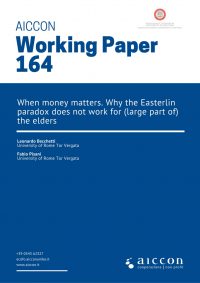164 – When money matters. Why the Easterlin paradox does not work for (large part of) the elders
Abstract
We compare life satisfaction levels for individuals aged 50 and above reporting/not reporting long term illnesses. Our econometric findings on the SHARE database including different waves for 19 countries show that the positive income/life satisfaction relationship is steeper for individuals with at least one long-term illness (and, among them, for those reporting unmet needs for medical examination above median, or lacking of private insurance). Our empirical analysis therefore shows that the Easterlin paradox does not work for a group of respondents accounting for almost one half of our entire representative sample of the population of European countries above that age. We as well show with the compensating variation approach that, for the long term ill, the marginal utility of income (net of absolute and relative income effects) is significantly larger than the average marginal income in the sample. The analysis on the economic significance of our findings can be considered as a benchmark for the value of complimentary health care or of private health insurance.
Keywords: health and life satisfaction, Easterlin paradox, value of health.
JEL numbers: I10, I18, I31.

